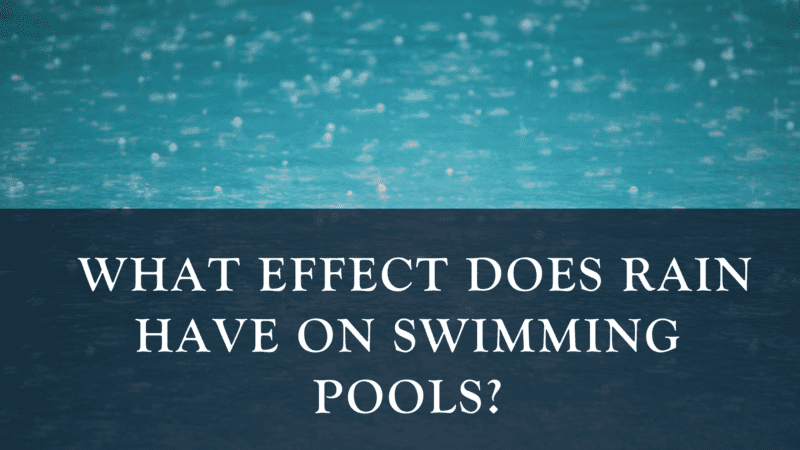How Does Rain Affect Your Swimming Pool?

There’s a lot of water care that goes into making sure your swimming pool stays in fine condition. Usually, when asked about pool contaminants, most homeowners will list everything except rainfall. Yet we’ve all heard about acid rain, and if you live in Nova Scotia, you know that it’s a huge problem. Besides thunderstorms, you should also worry about rain because it can affect your swimming pool in several ways. In case you’re wondering, here’s how.
Rain’s Effect on Your Pool’s Water Chemistry
Even before we get into it, you should know that this is not an anti-rain post. If you remember your 4th-grade science, when forming, rain is very pure. However, just before hitting the earth’s surface, the droplets pick up all kinds of pollutants, bringing about acid rain.
- Let’s talk about acid rain. When rain picks up sulphuric and carbonic acid, it becomes acidic with a pH ranging from 5.5 to 6.5. The ideal pool pH is anywhere from 7.4 to 7.6. If you experience heavy rainfall, this water disrupts your pool’s chemistry, making the water acidic and dilutes your pool’s chemicals.
- Heavy rainfall can also lower your pool’s total alkalinity level causing it to decrease by around ten parts-per-million. With low alkalinity, your pool’s water becomes corrosive enough to damage equipment.
- Rainwater can also mess up the calcium hardness in your swimming pool. Since the rain has 0 ppm calcium hardness, it could lower the water hardness if your pool has soft water. You would need to add in a calcium hardness increaser to get your pool to the optimum levels.
- Let’s not forget about rain’s effect on the chlorine levels. The thing with rainfall is that it picks up contaminants that demand higher chlorine levels to make the pool water safe for use.
Rain and Dirt
As mentioned before, rainwater has a habit of picking up stuff along the way. So aside from chemicals, a rainstorm usually spreads all kinds of dirt into your pool. Accumulation of debris and trash can clog up your pool’s filter. Another concern is the algae spores that come with rainfall. If left untreated, getting rid of algae can become a nightmare!
Flooding
Usually, any homeowner living in a catchment area gets scared whenever there’s a heavy downpour. Excessive rainfall not only damages your pool equipment but also lowers the efficiency of your pool’s skimmer.
What to Do After a Rainstorm
Here are some of the actions you should take immediately after a rainstorm.
- Check your pool’s water level. If your pool is flooded, use a pump to drain it to the right level. Ideally, the water should be ½ – ¾ of your skimmer’s entryway.
- Turn on your pool’s filter
- Clean your pool
- Test the pool’s water chemicals and adjust
- Give your pool a shock treatment
While rainfall is important for overall development, our pools don’t share the same experience. If our pools could talk, the first question would probably be why rain has to pick so many pollutants up along the way. The good news is that light rains rarely affect our pools. However, as a precaution, we recommend checking whether everything’s working whenever it rains. Thankfully, there’s no need for you to go at it alone. R&R pools offer expert cleanup after rainstorms and comprehensive water care. To learn more details about our services call us at 9028762773 today.

